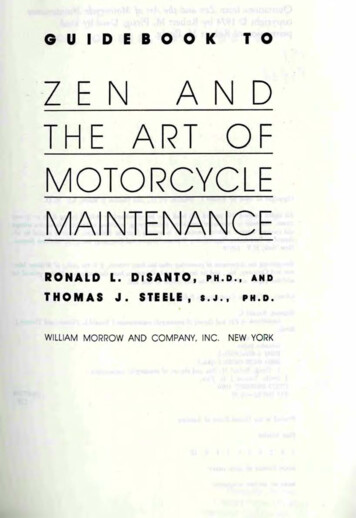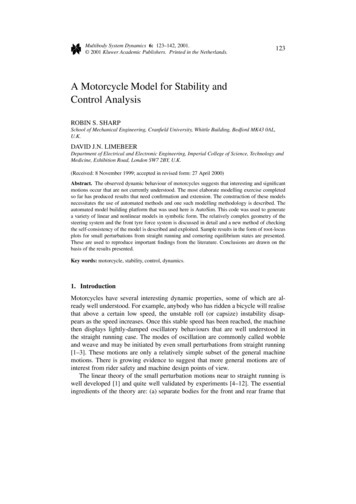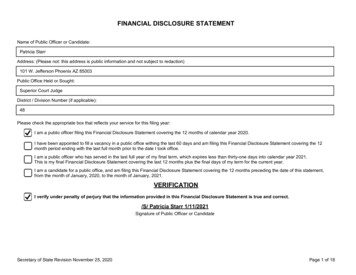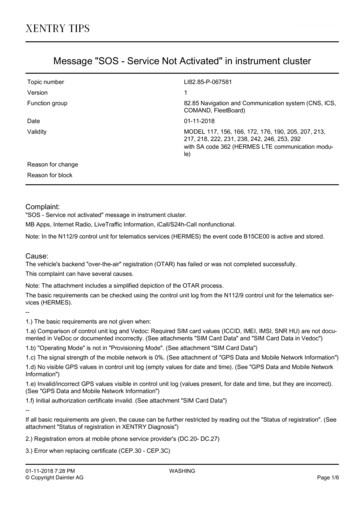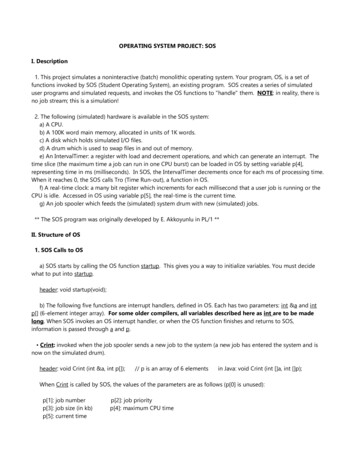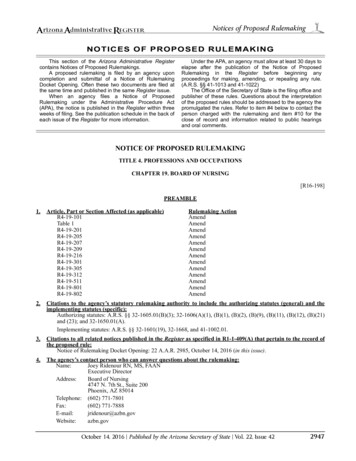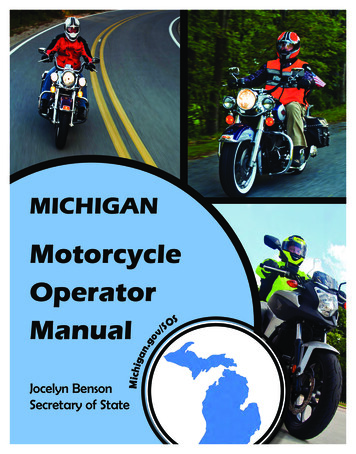
Transcription
celyn BensonSecretary of State
Michigan Department of State, April 2021This manual is a supplement to Michigan’s What Every Driver Must Know, which covers rules of theroad, signs, signals, roadway markings and safe driving practices.Information, graphics and pictures contained in this manual are provided courtesy of MotorcycleSafety Foundation and Highway Safety Services LLC as well as AAMVA Test MaintenanceSubcommittee & Stakeholders Advisory Group.MSF Motorcycle Safety Foundation2 Jenner, Suite 150, Irvine, CA 92618949-727-3227 / msf-usa.orgQR Code to the Michigan Rider Education Program Online Training Program LocatorAAMVAAAMVA AmericanAmerican AssociationAssociation ofof MotorMotor VehicleVehicle ite7004401 Wilson Boulevard, Suite 700Arlington,2220322203Arlington, .orgSOS-116 (Rev. 02/17)
QUICK TIPS: Should You Ride A Motorcycle?Riding a motorcycle is a unique experience. Riding is fun and invigorating, yet the skillsneeded for safe riding, combined with the lack of car-like crash protection on amotorcycle, can cast doubts on whether a person should choose to ride a motorcycle.Some potential riders lack the ability to execute skilled and timely actions in a complextraffic environment; others lack keen judgment or don’t have a firm grasp of the conceptof risk management.MSF believes that motorcycling isn’t for everyone. If you’re considering becoming arider, however, here are some questions for you to use as a self-assessment of thephysical capabilities and mental attitude required to safely navigate a motorcycle on thestreet:1. Are you a higher risk-taker than others you know? If you tend to need a thrill whiledriving a car and have aggressive or risky tendencies (following too closely,turning without signaling, talking on a cell phone, getting angry at other drivers,etc.), motorcycling may not be for you. While motorcycling improves the overallquality of life for many, for some it can lead to disaster. Thinking that accidentsonly happen to others is an attitude that will get you in trouble.2. Can you ride a bicycle? This is a prerequisite for enrolling in our BasicRiderCourse and generally a good gauge of your ability to maneuver a motorcycle.Bicycling, like motorcycling, is a physical activity that involves balance andcoordination. And speaking of coordination 3. Can you drive a stick-shift car? This is not a requirement, but it may makelearning to ride easier because almost all motorcycles have manual transmissions.If you can’t get the hang of shifting gears but still want to enjoy a powered twowheeler, you might want to start out on a motor scooter. Motor scooters generallyhave automatic transmissions and come in many sizes, from simpler models withan engine size of 50 cubic centimeters (cc) to powerful 650cc models.4. Do you see well? Riding a motorcycle requires special perceptual skills that relyon good vision. Have you had an eye examination recently? Do you tend to seethings that are far away later than other people you know? The ability to see wellahead is important for safe riding.
5. Are you mechanically inclined? Today’s motorcycles are very reliable machines,but with all the bolts, nuts, and mechanisms out in the open, and only two tiresconnecting you to the pavement, you need to be able to inspect your equipmentand make the occasional minor adjustment. You don’t need to be a mastermechanic, but it helps to know your way around a tire pressure gauge and awrench. Most everything a rider needs to know is in the motorcycle owner’smanual, and if you’ve never read your car owner’s manual, that could be a signthat motorcycling is not for you.6. Are you safety-minded? If you routinely find yourself bandaged up after doingsimple do-it-yourself projects around the house, or think it’s acceptable to operatea motor vehicle under the influence of alcohol, the unique challenges of motorcycleriding may not be compatible with your decision-making. Riders can control theirsituation only if safety is a high priority. Millions of motorcyclists ride millions ofmiles without incident, and they likely take safety seriously.7. Do you respect machinery and other equipment that has risk? For example, whenusing a lawn mower or chainsaw, do you maintain it properly and weareye/ear/hand protection when needed? If you’re not serious about safety inconnection with simple machinery and equipment whose improper use can lead toserious injury, you may not respect motorcycling enough to follow safetyprecautions. Successful riders know that safety isn’t a matter of luck, but a matterof doing the right things to minimize risk.8. Can you focus? Inattention is a major cause of crashes. Safe motorcyclingrequires dedicated attention to the immediate task and a keen awareness ofeverything going on 360 degrees around you. Rush-hour traffic aboard amotorcycle is not the place to be daydreaming. For instance, if you find yourselfoverusing your brakes because you were caught off-guard, or are often surprisedby a passing car or truck you didn’t see, your situational awareness could be lessthan adequate.9. Can you handle your car in an emergency? Drivers don’t often have the need tobrake hard or swerve to miss a crash, but it’s important to have the skills to be ableto do so when needed. On a motorcycle, having these types of skills is essentialbecause other highway users tend not to see motorcyclists in traffic, especiallyaround intersections.10. Are you willing to invest some time in learning to ride the right way before hoppingon a bike? Your best “first ride” is a Basic RiderCourse where you can familiarizeyourself with the safe operation of a motorcycle. You can even take the course asan experiment, to help you better understand the dynamics of good riding and todetermine if motorcycling is right for you.www.msf-usa.org5/09
ContentsSection OneMichigan Motorcycle Rider LicensingMotorcycle Endorsement . 1The Michigan Rider Education Program . 7Motorcycle Registration Requirements . 9Section TwoMichigan Motorcycle Laws .11Endorsements and Temporary Instruction Permits. 11Drugs and Alcohol. 12Civil Infractions . 12Equipment. 13Section ThreeBeing in Shape to Ride .16Alcohol, Other Drugs and Riding. 16MSF – Quick Tips: The Importance of Riding Unimpairedby Alcohol or Other Drugs . 18Section FourBefore You Ride.20MSF – What You Should Know aboutMotorcycle Helmets. 23Know Your Motorcycle. 27Pre-Ride Check. 28MSF – T-CLOCS Inspection Checklist. 30MSF – Quick Tips: Anti-Lock Braking System (ABS). 31Section FiveBasic Motorcycle Operation .32Getting Started. 32Turning . 34Section SixStreet Strategies .36Risk Management . 36Space Management . 38MSF – Quick Tips: Pretend You Are Invisible. 41Speed Management. 43Section SevenRoadway Management .Contents46i
Section EightSpecial Riding Situations .49Section NinePassengers, Cargo and Group Riding .53MSF – Quick Tips: Guidelines for Riding with a Passenger On Your Motorcycle. 56MSF – Quick Tips: MSF’s Guide to Group Riding . 58Section TenFactors Affecting Rider Performance .62Section ElevenThree-Wheel Vehicles .64Common Operating Characteristics of Trikes andMotorcycles with a Sidecar. 64Unique Operating Characteristics of Trikes. 65Unique Operating Characteristics of aMotorcycle with a Sidecar . 66Section TwelveSample Knowledge Test Questions .69Appendix . 70MSF – Quick Tips: General Guidelines for Riding a Motorcycle Safely. 71MSF – Seriously Safe Top Ten List . 72MSF – Motorcycle Safety Foundation Rider ChoicesTM Contract For Safely. 73iiContents
Section OneMotorcycle Rider LicensingMotorcycling is a unique experience. Comparedto a car, you don’t sit in a motorcycle, you becomepart of it. Not as a passive driver, but as an activerider, arcing into a string of smooth corners,playing along with the rhythm of the road;shifting, accelerating and braking with precision.Whether you ride to-and-from work or preferthe camaraderie of a group ride on the weekend,motorcycling engages all your senses and createsan invigorating sense of freedom.Along with that freedom, comes responsibility. Allstates require some form of license endorsementdemonstrating you possess a minimum levelof skill and knowledge. Take your time learninghow to operate your motorcycle and get plentyof riding experience. Find an experienced andresponsible motorcyclist to mentor your learning.This mentoring and riding experience will prepareyou for handling today’s traffic environmentThis Section Covers Motorcycle EndorsementTemporary Instruction PermitRider Skills TestMichigan Rider EducationProgram Motorcycle Registration Renewing Your Driver’sLicense General Driver’s LicenseRenewal Informationand reduce the potential for a crash. All ridersare encouraged to attend an entry-level ridereducation course which provides the informationand hands-on training required to obtain amotorcycle endorsement. You’ll learn how toimprove your riding skills and mental strategies,so you can be a safer, more alert rider. Thisbooklet and other motorcycle publications canhelp prepare you to be successful.Motorcycle Endorsement(1) A person, before operating a motorcycle,other than an autocycle, upon a public street orhighway, shall procure a motorcycle endorsementon his or her operator’s or chauffeur’s license. . . .(4) A person who violates subsection (1) is guiltyof a misdemeanor punishable as follows:(a) For a first violation, by imprisonment for notmore than 90 days or a fine of not more than 500.00, or both.(b) For a violation that occurs after a priorconviction, by imprisonment for not more thanone year or a fine of not more than 1,000.00, orboth.MCL 257.312a.In addition to the penalties outlined in the law,your motorcycle can be towed and impounded.Let’s face it, you’re unendorsed and you’ve justSection One: Motorcycle Rider Licensing1
been pulled over by a law enforcement officer.After the traffic stop, you can’t legally ride yourmotorcycle home, and parking it on the roadsideuntil you can make arrangements to have it pickedup leaves your bike vulnerable to theft or damage.Towing and impounding your bike is a possibleoutcome if you are caught riding unendorsed.Three-Wheel Motorcycle EndorsementAn endorsement issued to operate a three-wheelmotorcycle, other than an autocycle, is restrictedto that operation and does not permit operationof a two-wheel motorcycle. MCL 257.312b (3).*Three-wheel License Restriction Code: 20TeensTo apply for a motorcycle endorsement, you mustbe at least 16 and: Possess a valid Level 2 or Level 3 GraduatedDriver's License. Successfully complete an approved motorcyclerider education course. Visit a Secretary of State office and present theMotorcycle Rider Education course completioncertific
mechanic, but it helps to know your way around a tire pressure gauge and a wrench. Most everything a rider needs to know is in the motorcycle owner’s manual, and if you’ve never read your car owner’s manual, that could be a sign that motorcycling is not for you. 6. Are you safety-minded? If you routinely find yourself bandaged up after doing simple do-it-yourself projects around the .
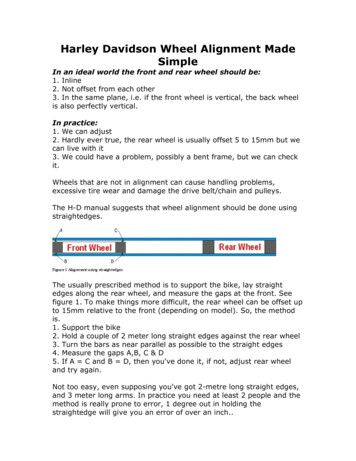
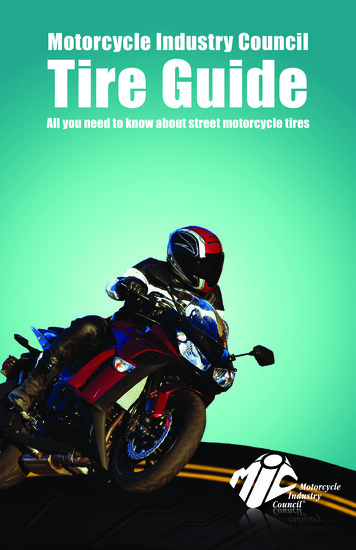
![Motorcycle Mechanic [MM] - CTEVT](/img/5/motorcycle-20-20mechanic-2010.jpg)
